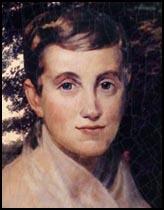Prudence Crandall

Prudence Crandall was born in Rhode Island on 3rd September, 1803. After being educated at a Society of Friends school in Plainfield, Connecticut, Crandall established her own private academy for girls at Canterbury.
The school was a great success until she decided to admit a black girl. When Crandall, a committed Quaker, refused to change her policy of educating black and white students together, parents began taking their children away from the school. With the support of William Lloyd Garrison and the Anti-Slavery Society, in March 1833, Crandall opened a school for black girls in Canterbury.
Local people were furious at Crandall's actions and attempts were made to prevent the school receiving essential supplies. The school continued and began to attract girls from Boston and Philadelphia. The local authorities then began using a vagrancy law against these students. These girls could now be given ten lashes of the whip for attending the school.
In 1834 Connecticut passed a law making it illegal to provide a free education for black students. When Crandall refused to obey the law she was arrested and imprisoned. Crandall was convicted but won the case on appeal. When news of the court decision reached Canterbury, a white mob attacked the school and threatened the lives of Crandall and her students. Afraid that the children would be killed or badly injured, Crandall decided to close her school down.
In August 1834 Crandall moved to Canterbury, Connecticut. where she married Calvin Philleo, a Baptist clergyman. Crandall was involved in the women's suffrage movement and ran a school in LaSalle County, Illinois. She separated from Philleo in 1842 after his "deteriorating physical and mental health" led him to be abusive.
In 1888 she told a friend: "My whole life has been one of opposition. I never could find anyone near me to agree with me. Even my husband opposed me, more than anyone. He would not let me read the books that he himself read, but I did read them. I read all sides, and searched for the truth whether it was in science, religion, or humanity. I sometimes think I would like to live somewhere else. Here, in Elk Falls, there is nothing for my soul to feed upon. Nothing, unless it comes from abroad in the shape of books, newspapers, and so on. There is no public library, and there are but one or two persons in the place that I can converse with profitably for any length of time. No one visits me, and I begin to think they are afraid of me. I think the ministers are afraid I shall upset their religious beliefs, and advise the members of their congregation not to call on me, but I don't care. I speak on spiritualism sometimes, but more on temperance, and am a self-appointed member of the International Arbitration League. I don't want to die yet. I want to live long enough to see some of these reforms consummated."
Prudence Crandall died in Elk Falls, Kansas, on 28th January, 1890.
Slavery in the United States (£1.29)
Primary Sources
(1) Prudence Crandall, quoted by a friend (1886)
My whole life has been one of opposition. I never could find anyone near me to agree with me. Even my husband opposed me, more than anyone. He would not let me read the books that he himself read, but I did read them. I read all sides, and searched for the truth whether it was in science, religion, or humanity. I sometimes think I would like to live somewhere else. Here, in Elk Falls, there is nothing for my soul to feed upon. Nothing, unless it comes from abroad in the shape of books, newspapers, and so on. There is no public library, and there are but one or two persons in the place that I can converse with profitably for any length of time. No one visits me, and I begin to think they are afraid of me. I think the ministers are afraid I shall upset their religious beliefs, and advise the members of their congregation not to call on me, but I don't care. I speak on spiritualism sometimes, but more on temperance, and am a self-appointed member of the International Arbitration League. I don't want to die yet. I want to live long enough to see some of these reforms consummated.


